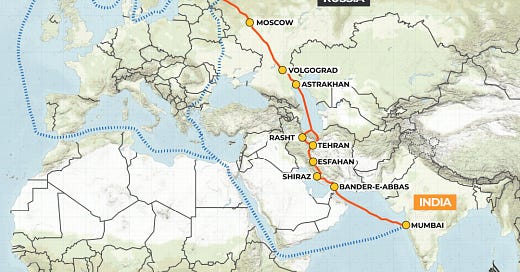North Korea operating KIC factories; Seoul to hold anti-WMD exercises; INSTC completion soon?; Tehran trying to ween off the dollar.
Prohibited Transactions for the week of 8 May 2023
North Korea
North Korea appears to have fully destroyed Hotel Haegeumgang – a floating hotel owned by South Korea’s Hyundai Asan – which was moored at the Mount Kumgang Tourist Region. Pyongyang also appears to be illegally operating at least 10 South Korean factories at the now-shuttered Kaesong Industrial Complex (KIC). Seoul has voiced its willingness to support any companies that want to take legal action against Pyongyang for damaging or using South Korean property left in the joint tourism or the joint industrial area. //Even if a South Korean company won a judgement and was awarded monetary relief, they have no practical way to collect money from the North.
A new tourism and economic zone – the Jilin Antu Changbai Mountain Border Tourism Experimental Zone – is being built in Northeastern China, on the border with North Korea. The company which won the construction bid hopes that the project will encourage the import of North Korean ore and export of Chinese steel. //Both which are illegal under UN sanctions.
Rumors continue to circulate that the North Korean border will be opened soon, perhaps within the next month.
Seoul plans to hold a multinational anti-WMD proliferation exercise later this month to boost participants’ maritime interdiction capabilities. The exercises are scheduled to coincide with a high-level meeting of the Proliferation Security Initiative that is taking place in South Korea.
The impasse over the UN Panel of Experts appears to have been resolved with no disruption to their activities, as the current UK coordinator is being forced out of his role, to be replaced by another UK diplomat in the summer.
A US government official stated that approximately half of North Korea’s missile program has been funded by cyberattacks and theft of virtual currencies.
Iran
Iranian and Russian officials indicated they may sign an agreement later this month to complete construction of the Rasht-Astara rail section in Iran, which is part of the larger 4,474 mile (7,200 km) International North-South Transport Corridor (INSTC), a multimodal network of rail, ship and road routes to move goods between India, Iran, Azerbaijan, Russia and Europe.
The 164 km Rasta-Astara rail section will connect the two Iranian cities together, completing the INSTC and create physical rail links between Chabahar Port and Bandar Abbas in Iran, to Russia via Azerbaijan. //Tied in with all of the trade implications of a shorter transport route between India and Europe, is how the INSTC can easily be exploited by any number of illicit actors to smuggle goods, particularly for the benefit of Moscow and Tehran. Russia has already been engaging in “ghost trade” to evade European Union sanctions, and a completed INSTC will provide another route for goods to end up where they shouldn’t.
Iran and Iraq have also signed an agreement to establish a rail connection between the two countries. //Once completed, this would give Iran rail connections to Syria and Turkey.
An Iranian government spokesperson stated that US dollars make up less than 10 percent of Iranian foreign trade, down from 30 percent two years ago. Tehran is focusing on barter trade, connecting the nation’s electronic payment network to other countries in the region, and using local currencies of trading partner countries to avoid dollars.
Iran’s president asked the Central Bank of Iran (CBI) to work on creating conditions so that trade transactions with other countries could happen in rial’s.
Iran’s petroleum minister stated that due to sanctions, more than 75 percent of the equipment needed by the oil industry is now supplied by domestic manufacturers.
A multinational task force patrolling the Gulf of Oman seized 1,964 kg of heroin – worth approximately USD80 million – from a fishing boat which departed from Chabahar Port.



